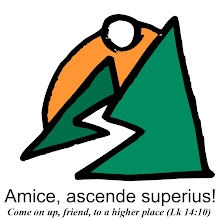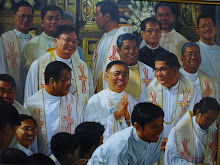skip to main |
skip to sidebar

The focus of today’s solemnity is life. All three readings speak of blood poured in sacrifice – blood which for the Jews stood for the principle of life itself, blood which also stood as symbol of the covenant between God and His people, purifying blood that symbolized cleansing from iniquities that makes one worthy “to worship the living God.” In the Gospel account, the same symbolism comes out strong: “This is the blood of the covenant, which will be shed for many.” (Mk 14:24)
Mark’s gospel tells us that after the passover meal, “they went out to the mount of olives.” It was there that later in the night, the Lord “sweated blood” (Lk 22:44) in the moment of extreme agony, at a moment when he was fully aware of what his self-offering would cost him – no less than his own life.
This is the life that we celebrate and extol in today’s solemn feast.
Undeniably, it has become difficult, if not close to impossible, nowadays to fully celebrate the feast in the traditional manner. It has become difficult, in fact inadvisable now, to make splendid processions and construct huge altars from which to expose the Blessed Sacrament and then to bless devotees with, after rituals of veneration right in the main thorougfares. Globalization, abetted by a strong current of secularism and pluralism even in matters of faith, have conspired in the recent decades to make such triumphalistic and ritualistic manifestations of devotion look a little too medieval in approach and style. In this fast-paced and result-oriented society, the traditional “pious stare” accorded the mystery of the Real Presence of Christ in the Blessed Sacrament through the practice of the Benediction of the Blessed Sacrament, has taken a back seat to that which rightfully ought to be given more importance – the lively, active and “live” event of salvation that takes place in the celebration of the Eucharist.
This celebration of the Eucharist, therefore, taking place in “real time,” here and now, ought to be given due priority and attention by us who have chosen to take part in it. True to its primary symbolism of LIFE, the Eucharist taking place now, the making-present once again of the sacrifice of Christ’s outpouring of blood and the sharing of his body to us all, is more important than merely exposing the Blessed Sacrament for adoration of the faithful.
All this is to say something very important. What counts as most important is the full, conscious, lively and active participation in the unfolding sacrifice that is now being celebrated by God’s people at the MENSA VERBI (the table of the Word) and the MENSA EUCHARISTIAE (the table of the Eucharist). Without in any way denigrating and downgrading the laudable practice of the adoration given to the Blessed Sacrament, the Church, through today’s solemnity, merely teaches us that the celebration itself of the Eucharist, is a unique and special presence of Jesus in his body, the Church now gathered as one family in worship. His blood now unites us all into one body despite our differences. His blood now purifies this same body and nourishes each and every single member. And since the outpouring of blood leads to death, Jesus’ death now becomes our passport to the celebration of life and unity that is what this Eucharistic celebration is all about – a celebration of Christ’s body and blood!

Oneness…fullness…completeness…totality…wholeness…The Solemnity of the Most Blessed Trinity today seems to remind us of all the foregoing concepts – and more! The readings today were all from books written well before the term “Trinity” was introduced in theological discourse. But Scripture that has come down to us through the centuries reflects the “lived theology” of the community of believers. Obviously, the reality of the Trinity preceded the terminology. The faith in the Trinity antedated the invention of a term (or a symbol) to stand for the truth held in faith in people’s minds and hearts, long before the word was uttered in their mouths.
All God has taught… all God has uttered… and all God has commanded! This represents the body of truths celebrated by the early Church in the liturgy. An ancient dictum says it all: Lex orandi, lex credendi. As the Church prays, so does the Church believe. What the Church holds in faith is what the Liturgy celebrates and proclaims.
Very early on, faith in the Triune God has been part of the whole structure, content and practice of prayer and worship of the incipient Church. Thus could St. Paul confidently teach: “For those who are led by the Spirit of God are sons of God. For you did not receive a spirit of slavery to fall back into fear, but you received a Spirit of adoption, through whom we cry, “Abba, Father!” The Spirit himself bears witness with our spirit that we are children of God…heirs with Christ.” (Rm 8:14-17)
The word “Trinity” is not found anywhere in Scripture. But the truth about this essential nature of the God who revealed Himself ever so gradually through history and, most especially in Christ, His Son is an incontrovertible fact that is clear in the same Scripture. The “lived theology” of Paul, the evangelists and the early Christians is a clear manifestation of the fullness, completeness and wholeness of their faith in the “one Lord, one faith, one baptism, and the one God and Father of all.” (Eph 4:5) “The grace of the Lord Jesus Christ and the love of God and the fellowship of the holy Spirit be with all of you.” (2Cor 13:13) No less than Jesus himself, after convoking his disciples for the last time, reveals yet another facet in the nature of God again on a mountain, like he did during the Transfiguration, like he did when he started proclaiming the Kingdom. It was on the mountain that he gave them final instructions: “All power in heaven and on earth has been given to me. Go, therefore, make disciples of all nations, baptizing them in the name of the Father, and of the Son, and of the Holy Spirit, teaching them to observe all that I have commanded you.” (Mt 28:18)
Today, the Liturgical celebration forms part of a series of Solemnities called solemnities of the Lord in which we are invited to reflect on some aspects of our “one faith” in the “one God and Father of all.” That faith, we would do well to remind ourselves today, is one, whole, and entire, with nothing added, and nothing subtracted from what has been revealed to us in Christ. Today, we claim and proclaim, by way of a fitting celebration of worship, our faith in God the Father, God the Son, and God the Holy Spirit, as part of all God has taught and commanded… nothing more, nothing less, nothing else! “Glory to the Father, the Son, and the Holy Spirit; to God who is, who was, and who is to come.” (cf Rev. 1:8)



